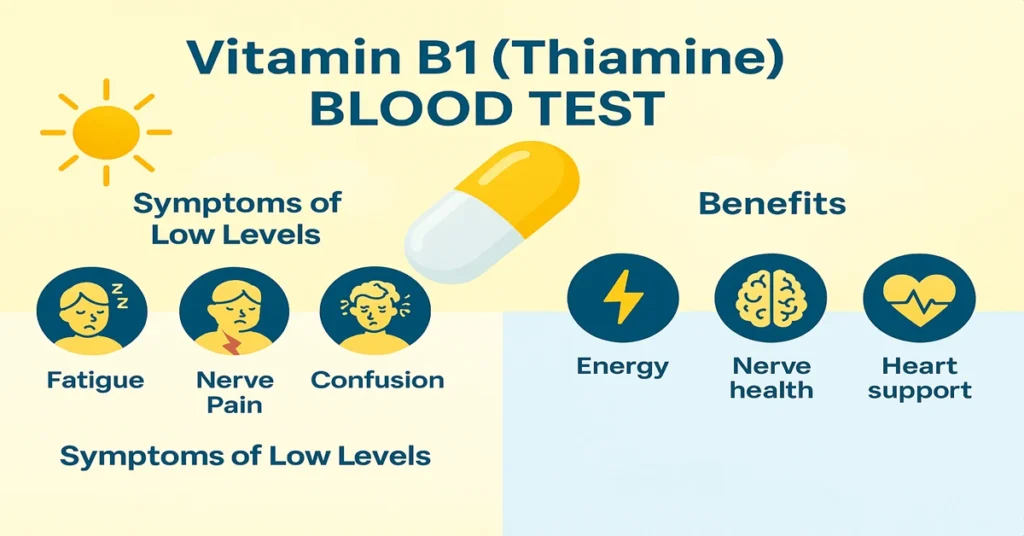What is Vitamin B1 (Thiamine)?
Vitamin B1, also known as Thiamine, is a water-soluble vitamin that belongs to the B-complex family.
It plays a vital role in energy production, nervous system health, and muscle function.
Since it is water-soluble, the human body does not store large amounts, so a regular intake through diet is essential.
Low Vitamin B1 levels can lead to nerve and heart problems, while adequate levels keep your body energetic and healthy.
Where is Vitamin B1 Synthesized or Produced in the Body?
The human body cannot naturally produce Vitamin B1, so it must be obtained from external sources.
A small amount is produced by gut bacteria, but it is not enough to meet daily requirements.
Main Sources of Vitamin B1:
- Whole grains (brown rice, oats, wheat)
- Legumes (beans, lentils, peas)
- Nuts and seeds (sunflower seeds, peanuts)
- Pork and lean meats
- Fortified cereals and bread
Main Functions and Importance of Vitamin B1
Vitamin B1 supports several vital processes in the body. Its main roles include:
- Energy Metabolism:
Helps convert carbohydrates into energy and supports glucose metabolism. - Nervous System Health:
Maintains nerve function and helps in signal transmission between nerves. - Muscle and Heart Function:
Important for normal muscle contraction and maintaining heart rhythm. - Brain Function:
Supports concentration, memory, and prevents neurological disorders. - Digestion and Appetite:
Aids in proper digestion and helps maintain appetite balance.
Without enough Thiamine, the body struggles to use energy efficiently, leading to weakness, nerve issues, and fatigue.
Causes of Low Vitamin B1 Levels (Deficiency)
Deficiency of Vitamin B1 is usually linked to poor nutrition or absorption problems.
Common causes include:
- Poor diet or malnutrition
- Chronic alcoholism (alcohol reduces absorption and storage)
- Prolonged diarrhea or malabsorption syndromes
- Long-term use of diuretics (increased urinary loss of thiamine)
- Hyperthyroidism, pregnancy, or lactation (increased demand)
Alcoholism is one of the most common causes of Vitamin B1 deficiency worldwide.
Symptoms of Low Vitamin B1 (Deficiency)
Low Vitamin B1 levels affect the brain, nerves, muscles, and heart.
Symptoms vary from mild fatigue to severe neurological disorders.
Mild to Moderate Deficiency:
- Fatigue and weakness
- Loss of appetite
- Tingling, numbness, or burning in hands and feet (peripheral neuropathy)
- Muscle cramps or pain
- Irritability, confusion, or memory loss
Severe Deficiency:
- Beriberi:
- Wet Beriberi: Affects the heart and can cause heart failure, swelling (edema), and breathlessness.
- Dry Beriberi: Affects the nerves, leading to numbness, weakness, and muscle wasting.
- Wernicke–Korsakoff Syndrome:
Seen in chronic alcoholics; causes confusion, vision problems, lack of coordination, and memory loss.
Causes of High Vitamin B1 Levels
High Vitamin B1 levels are rare, because the vitamin is water-soluble and excess amounts are excreted in urine.
However, elevated levels can occur due to:
- High-dose supplements or injections
- Therapeutic overuse in rare cases
Symptoms of High Vitamin B1 Levels
Usually, high levels don’t cause major harm, but very high supplementation may cause:
- Headache
- Irritability or restlessness
- Rapid heartbeat
- Mild skin reactions or itching
Toxicity is extremely rare since the body naturally removes excess Thiamine through urine.
Reference Ranges (Normal Levels)
| Type | Normal Range | Unit |
|---|---|---|
| Blood Thiamine (Vitamin B1) | 66 – 200 | nmol/L |
Slight variations may occur between laboratories.
Levels below 66 nmol/L generally indicate deficiency, while above 200 nmol/L may be due to supplementation.
Sample Type and Test Information
- Sample Type: Plasma
- Tube Used: EDTA (Whole Blood)
- Fasting Required: Usually not necessary, but follow doctor’s advice
- Testing Method: High-Performance Liquid Chromatography (HPLC) or immunoassay methods
How to Maintain Healthy Vitamin B1 Levels
- Include whole grains, legumes, nuts, and seeds in your daily diet
- Avoid excessive alcohol intake
- Take balanced multivitamins if your diet is lacking
- Manage chronic conditions that affect nutrient absorption
- During pregnancy or illness, discuss supplementation with your doctor
Health Conditions Related to Vitamin B1 Deficiency
Deficiency may lead to or worsen:
- Beriberi (heart and nerve-related disease)
- Wernicke–Korsakoff syndrome (alcohol-related brain disorder)
- Peripheral neuropathy
- Muscle weakness and fatigue
- Heart failure or irregular heartbeat
- Poor appetite and weight loss
When Should You Get a Vitamin B1 Test?
A doctor may suggest this test if you have:
- Chronic fatigue or muscle weakness
- Nerve pain, tingling, or burning sensation
- Confusion or memory issues
- Long-term alcohol use
- Persistent vomiting or diarrhea
- Malnutrition or unbalanced diet
- Heart-related symptoms (palpitations, swelling, shortness of breath)
Test Preparation
- Usually, no fasting is required
- Avoid taking Vitamin B-complex supplements 24–48 hours before the test
- Inform the doctor about medications or alcohol intake
- Stay hydrated before sample collection
When to Consult a Doctor
Consult your doctor if:
- You have persistent fatigue, muscle cramps, or nerve pain
- You have a history of alcoholism
- You are on long-term diuretics or have thyroid/liver problems
- Your Vitamin B1 level is below 66 nmol/L or above 200 nmol/L
Doctors may suggest dietary changes, supplements, or injections depending on the deficiency severity.
Important Word Explanations
| Term | Simple Meaning |
|---|---|
| Thiamine | Scientific name for Vitamin B1 |
| Water-soluble | Dissolves in water and is not stored in the body |
| Peripheral neuropathy | Nerve pain or tingling in hands and feet |
| Beriberi | Disease caused by severe Vitamin B1 deficiency |
| Wernicke–Korsakoff Syndrome | Brain disorder due to long-term B1 deficiency, common in alcoholics |
| EDTA Tube | Blood collection tube that prevents clotting for plasma tests |
~END~

